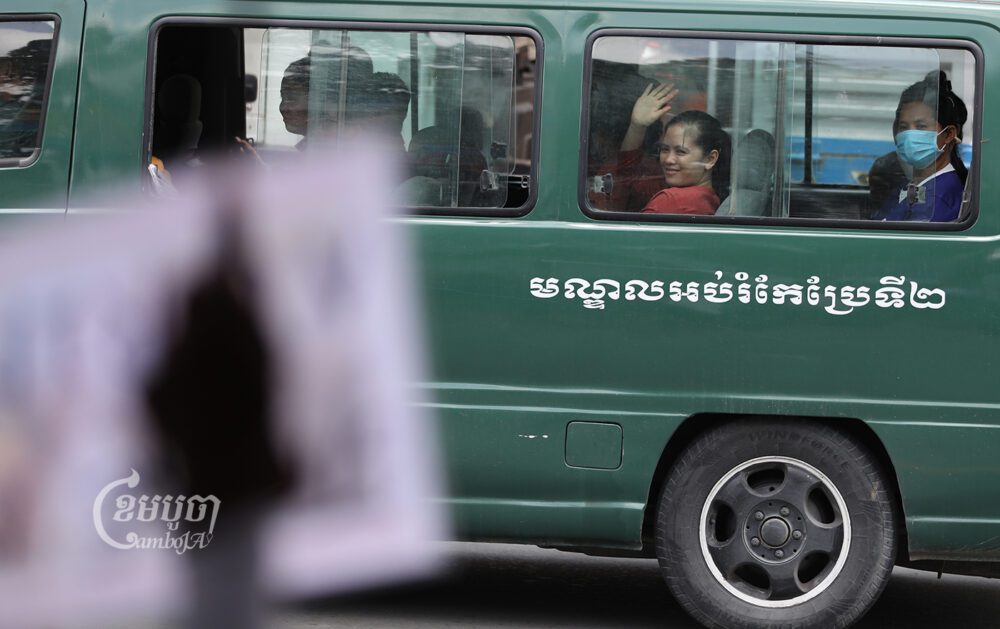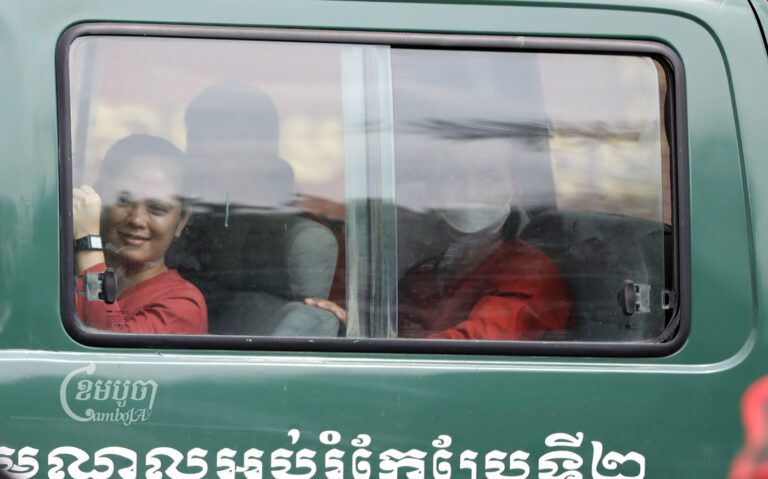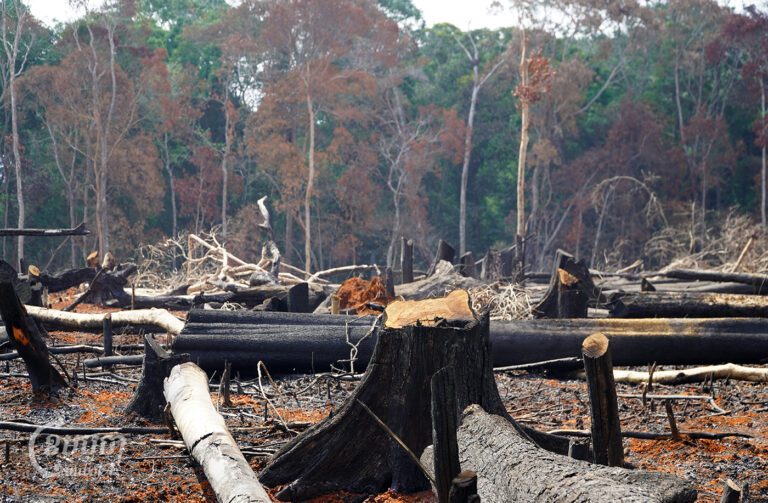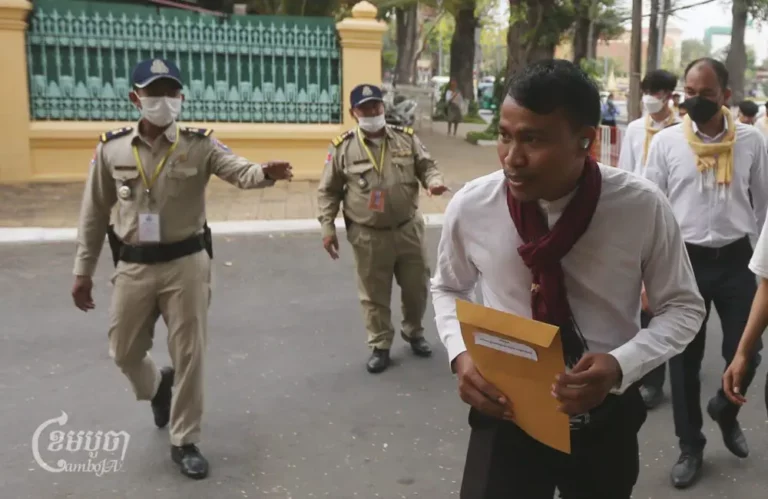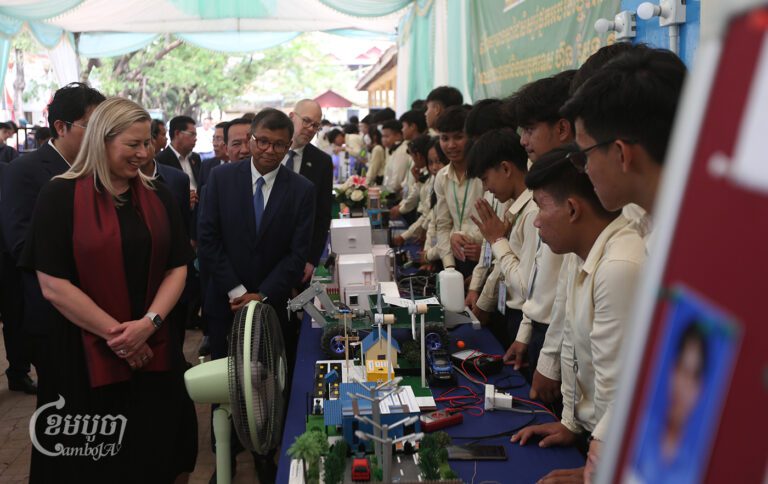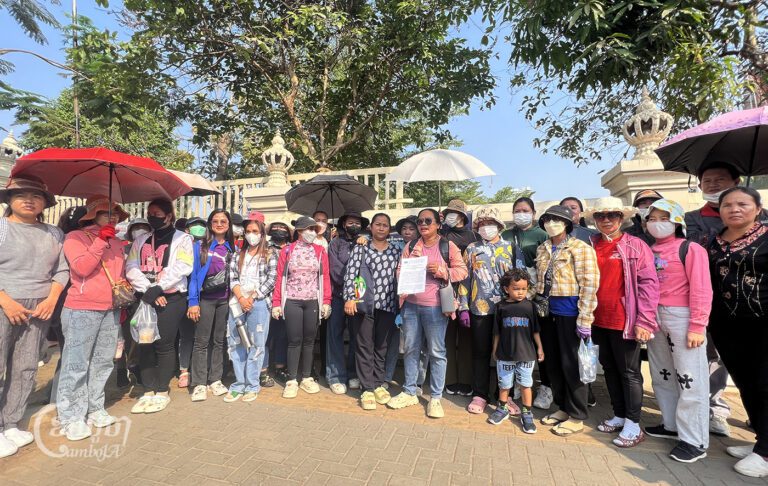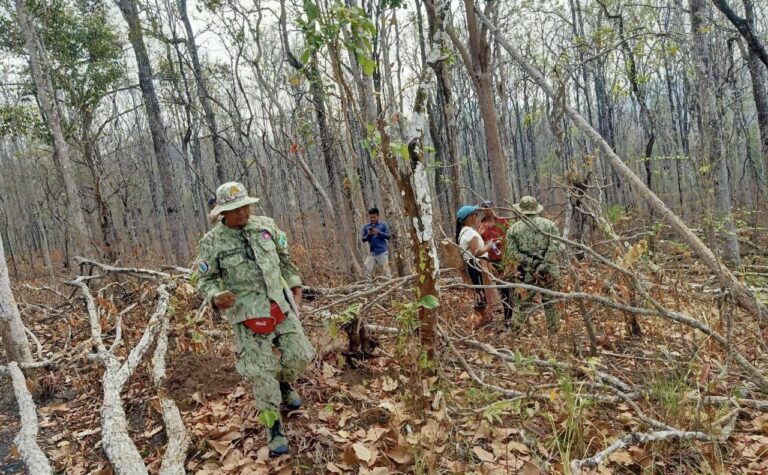NagaWorld union leader Chhim Sithar and eight union co-defendants requested acquittal for their lawful strike during Wednesday closing statements, while prosecutors compiled a collage of evidence to portray the labor struggle as an act of incitement.
The Phnom Penh Municipal Court is scheduled to announce its verdict on May 25. The nine defendants face incitement charges after they initiated a strike, ongoing since December 18, 2021 in protest of mass layoffs and alleged union-busting. Authorities declared the strike illegal when it was announced, but gatherings of a hardcore group of dozens of union members still protest twice a week.
“I have asked the judge to drop all charges,” Sithar said. “We have to follow the law.”
Sithar, the union’s president, has claimed that the strike was a legal avenue for a labor dispute after NagaWorld’s management committee failed to resolve workers’ complaints in good faith during months of negotiations. In February, Sithar received an award recognizing her as a “human rights defender” by the U.S. State Department.
Deputy prosecutor Seng Heang reiterated his argument that the union’s strikers had never received permission from authorities.
“The prosecutor views there is enough evidence in which there is activity consistent with incitement charges, so the prosecutor has asked the judge for punishment according to law,” Heang said, referring to himself in the third person.
Article 495 in Cambodia’s criminal code states that incitement can carry a six month to two year prison sentence, along with a 1 million ($250) to 4 million riel ($1,000) fine.
Heang pointed out that the union had received international funds from several international organizations — the U.S-based non-profit East West Management Institution (EWMI), the women’s rights NGO JASS, and the labor rights group North America Unite Here. While many Cambodian organizations receive funding from overseas groups, Heang claimed the NagaWorld union’s funding was used to carry out prohibited demonstrations.
“[Defendants] received unlawful funds from outsiders that were used under the pretext of labor rights and human rights, but they had ill-intentions to disturb turmoil in society,” Heang said.
The prosecution had previously played around 30 minutes of audio recordings — from a pool of more than 50 Zoom meetings comprising about 3 hours — as evidence that the NagaWorld union had malicious criminal intentions.
“In case authorities arrest me, we will turn to violence,” one undated audio recording of Sithar said. The prosecutor also shared a clip in which the union leader said “before leaving, we will destroy the rice pot” which the prosecutor interpreted as destroying NagaWorld; in Khmer, the term “rice pot” can refer to a source of financial revenue.
But Sithar said the prosecutor was twisting her words and claimed her comment about the “rice pot” had been referring to a case in which the previous leader of the union accepted compensation and abandoned the workers during a past labor struggle.
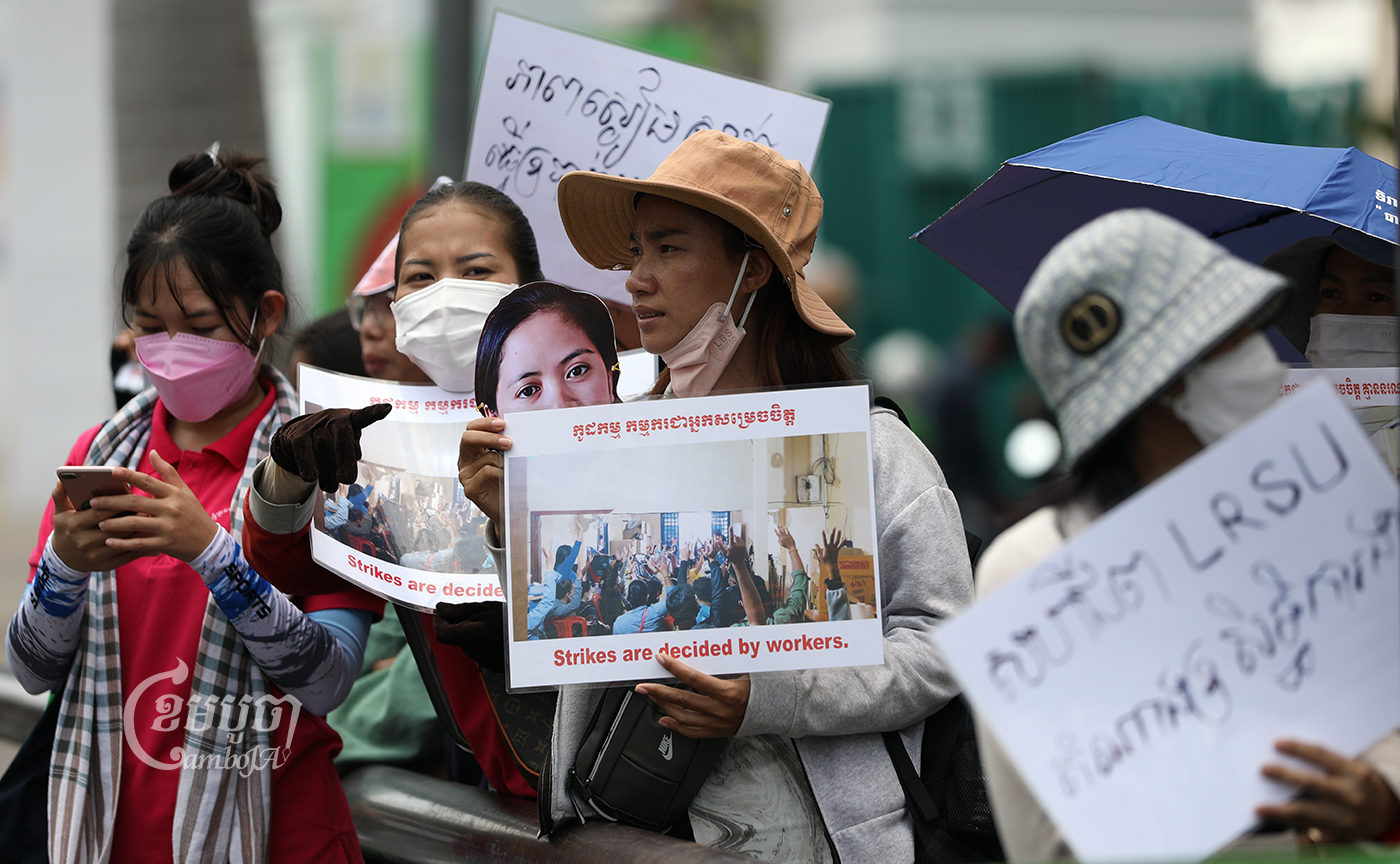
Defense lawyer Sam Sokunthea said that the prosecutor had extracted out of context messages to pin blame on Sithar. In last week’s hearing, the judge rejected Sithar and her co-defendants’ request to play in their entirety all audio recordings used as evidence by the prosecutor. Sokunthea said the selections of clips did not reflect Sithar’s overall message or the union’s activities throughout the year-long strike.
“The whole of the content is not calling for the use violence,” she said.
NagaWorld strikers, who broadcast a nonviolent message in public comments, have faced violence from authorities and even their bosses — the grown son of the CEO of NagaCorp allegedly threw a traffic cone at strikers after grabbing a striker’s phone and hurling it into the pavement last year.
Heang, the prosecutor, also claimed the union members were no longer employed by the company and therefore not legally able to strike. He called attention to the union’s strategy of putting pregnant women in the front line as incitement, claiming the tactic was designed for the union to create situations to accuse authorities of human rights violations.
The prosecution further cited international funds transferred to individual bank accounts of union leaders rather than to an organizational account for the union.
Sokunthea said that international funds were a form of “humanitarian assistance” during the Covid-19 lockdowns in April and early May 2021 as some workers did not have sufficient income — even though the strike had not yet begun, NagaWorld employees already faced reduced salaries. She said that funds were transferred to individual accounts because it was easier to directly help members, as a joint account for the union was difficult to approve during the lockdown.
She added that there is nothing illegal about a union accepting funds from international groups.
“The law on trade unions has allowed local unions to make an alliance with international unions, it isn’t wrong to receive those funding,” she said.
Regarding the placement of pregnant women on the front lines, Sokunthea explained that it was a strategy to reduce violence in case strikers clashed with authorities.
“The whole [messages] she put forward was [for strikers] not to respond with violence,” Sokunthea said.
Getting at the heart of the prosecution’s argument that the strike was illegal because authorities had denied permission for the initial gathering, Sokunthea said that holding a strike did not require the approval of authorities under Cambodian law.
“They do not need permission [from authorities], just informing them is enough,” Sokunthea said.
Article 324 of Cambodia’s labor law states that a strike must provide “prior notice of at least seven working days” to the employer and Labor Ministry and “precisely specify the demands which constitute the reasons for the strike.” Article 7 of Cambodia’s demonstration law also requires five days of prior notice. There is no requirement to receive permission from authorities in either law.
Co-defense lawyer Hong Sambath said he was disappointed that prosecutors were seeking to portray a “labor dispute” as criminal activity, arguing the workers were engaging in a legal avenue available to seek redress for legitimate grievances following a collapse in negotiations with the company.
The root cause of the strike, Sambath argued, was the lack of resolution from NagaWorld, the Ministry of Labor, and Cambodia’s Arbitration Council. In September 2021, the council issued a non-binding asking the company to recalculate severance pay but declined to rule on the legality of the mass lay-offs affecting more than 300 workers and all the union’s leaders.
“We have seen that the strike continues right now due to the labor dispute,” he said.
Human rights NGO Licadho’s operations Am Sam Ath called on the court to drop the charges against the defendants.
“I have seen there is not any evidence implicating the nine defendants in incitement charges because it is entirely a labor conflict,” he said. “To avoid accusations of restricting the rights, freedom of unions, workers and citizens, the fundamental rights for holding a strike are guaranteed by the law. They [the prosecution] have been using the criminal code to restrict all those rights.”


